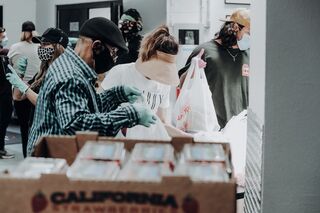Health
Food, Sharing, and Mental Health in the Pandemic
More evidence that kindness counts.
Posted January 19, 2021 Reviewed by Abigail Fagan
by Alexandra Brewis and Amber Wutich
COVID-19 doesn’t just make people sick when they catch the virus. Pandemics like COVID-19 can create other forms of illness in many different ways. People delay care for other illnesses while hospitals struggle to cope with insufficient staff or beds. The economic fallout, such as from job losses, can make it harder to stay well when it means a lack of necessary basic resources. This can include having to make difficult decisions about how to allocate limited income to food, rent, heating, or medical care. Also, how to safely access groceries or medical care becomes a concern. Pandemics like COVID-19 are also very isolating, cutting us off from others.
A study released this week in the American Journal of Preventive Medicine, is showing how complexly all these factors can be interrelated — worsening each other in complex ways. The survey of 63,674 people found that food insecurity was rising along with COVID-19 cases. Food insecurity here means being unable to access enough safe food to meet your family’s basic needs. Those most likely to be affected included those who are older, recently unemployed, and with larger households. And associated with those failures to get enough to eat was an elevated risk of depression and other mental illness.

The study also found that the generosity of others is an enormous help, not just for reducing hunger but also for improving mental health. About one-tenth of households in the U.S. reported they were accessing free groceries or meals, such as through food banks or from friends of neighbors. And doing this significantly reduced the risks of experiencing depression and anxiety.
Sharing matters for reasons beyond just stabilizing people’s access to food. For one thing, worry and frustration about where food will come from worsens depression. Just knowing there is a back-up if you need a meal will greatly reduce this. Also, insufficient food can be deeply shaming for many, which is also a risk factor for depression. Knowing others understand your plight, do not blame you, and want to help you can accordingly ease this aspect of mental suffering. This new study reminds us, yet again, that kindness is always central to managing the myriad harmful effects of a pandemic.


